Cultivating the Future: The 2025 Sustainable Regenerative Agriculture Conference in Arusha
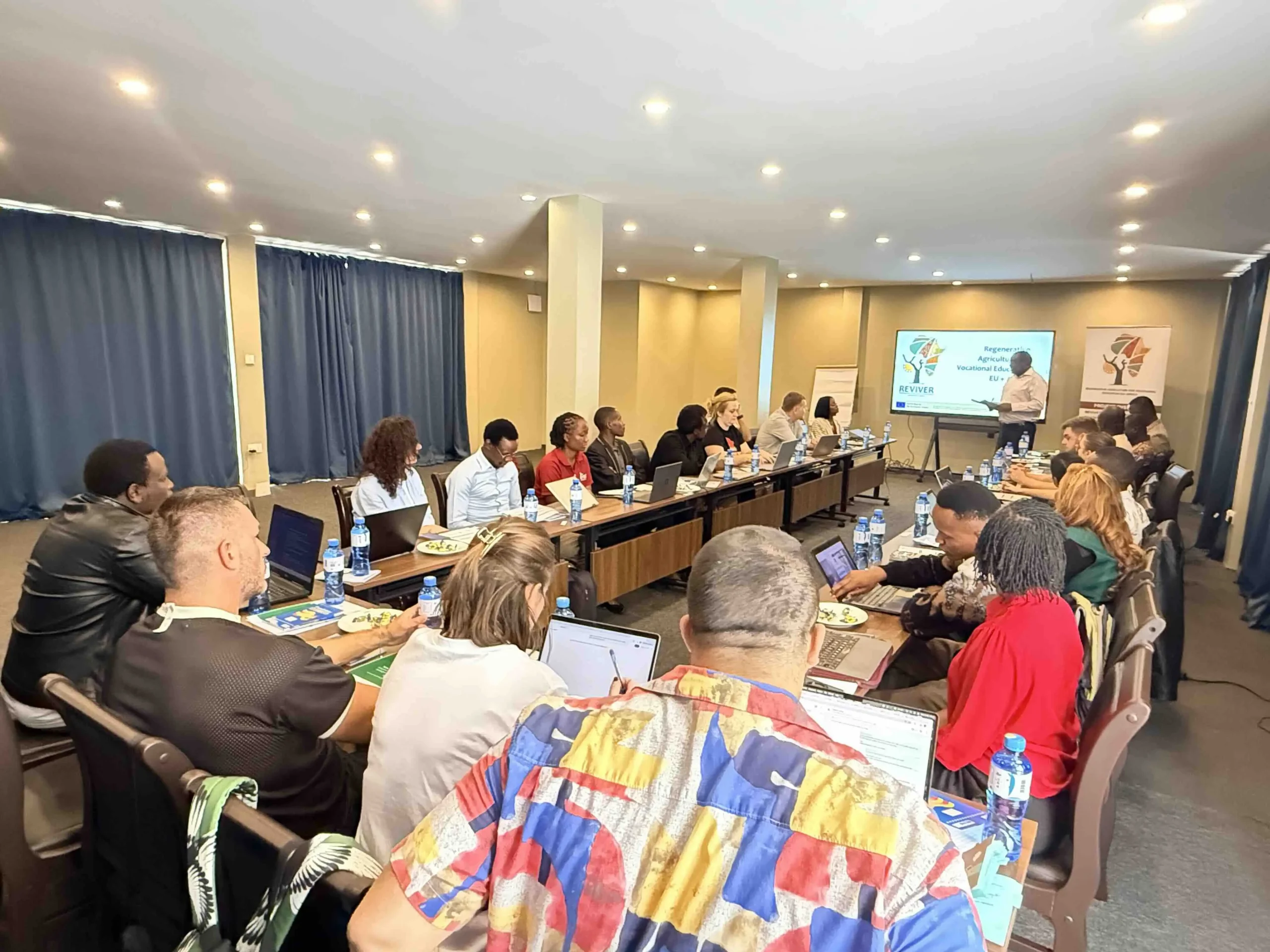
From October 13 to 15, 2025, the Greenside Hotel in Arusha, Tanzania hosted the Sustainable Regenerative Agriculture International Conference, convened under the theme “Promoting Regenerative Agriculture Curriculum and Practices as a feasible solution to attaining green economy and environmental sustainability.” The event, organized by Apex Agribusiness Academy in collaboration with partners from Europe and Africa, served as a platform to share knowledge, strengthen networks, and chart pathways for the adoption and scaling of regenerative agriculture across Sub-Saharan Africa.
This conference represents a key milestone in the broader REVIVER Project (Regenerative Agriculture for Vocational Education EU + Africa), an Erasmus+ initiative aimed at transforming agricultural education and practice across Europe and Sub-Saharan Africa. Below is a look into the event’s structure, highlights, and the broader context of the REVIVER initiative.
Objectives and focus areas
The conference set out to accomplish several interlinked goals, consistent with the REVIVER project’s aims. The published conference objectives (from your photo) were:
- Promote the exchange of ideas, knowledge, and innovations in regenerative agriculture
- Promote curriculum and tools developed in the project
- Discuss the current state of regenerative agriculture and provide mentorship opportunities in future work
- Share knowledge, experience and foster multi-stakeholders’ collaboration and dialogue in the field of regenerative agriculture
- Identify pathways for adopting and scaling regenerative agriculture curriculum and practices in Sub-Saharan Africa
These objectives resonate strongly with REVIVER’s mission: to develop a vocational curriculum for regenerative agriculture tailored to regional contexts, connect European and African knowledge systems, and enhance the skills and employability of young farmers and vocational education and training (VET) providers.
Conference program and themes
The three-day agenda (13–15 October) offered a rich mix of plenaries, technical sessions, roundtables, and networking opportunities. Salient moments included:
- Day 1 (October 13): Opening remarks, a global panorama of regenerative agriculture, and sessions on sharing VET test training and pilot programs across Europe and Sub-Saharan contexts.
- Day 2 (October 14): Focus on innovations, curriculum integration for VET providers, and barriers and enablers for scaling regenerative agriculture in Africa.
- Day 3 (October 15): Emphasis on networking, policy support strategies, action planning, group commitments, and closing.
Throughout the sessions, key themes were climate resilience, soil health, biodiversity, water management, digital tools, and the socio-economic dimensions of farmers’ livelihoods.
One notable element was the discussion on “Policy support initiatives for regenerative agriculture (how to influence policy makers to adopt the findings from REVIVER into policies/strategies).” This underlines the project’s recognition that technical training must be matched by enabling policy environments if change is to scale.
REVIVER project: context and achievements
To fully appreciate this conference, it’s helpful to understand the REVIVER project’s scope and achievements to date.
What is REVIVER?
REVIVER (Regenerative Agriculture for Vocational Education EU + Africa) is a 24-month Erasmus+ capacity‐building initiative (December 2023 – November 2025) designed to transform vocational training and farming practices across several partner countries in Europe and Sub-Saharan Africa.
The project consortium includes six organizations:
- Pannonia Consulting (Croatia) – leading curriculum and business development
- Kua Zone Innovation College (Kenya) – digital learning and agribusiness components
- University of Education, Winneba (Ghana) – educational policy and pedagogy
- Outside Media and Knowledge (Germany) – communications, dissemination, visibility
- Apex Agribusiness Academy (Tanzania) – deep roots in Tanzanian agribusiness networks
- Learning Library (Estonia) – digital education, e-modules, online tools
The project’s primary pillars are:
- Vocational curriculum development: Creating a “VET Curriculum for Aspiring Regenerative Farmers” adapted to both European and Sub-Saharan African ecological and socio-economic settings.
- Research and context analysis: Conducting comprehensive studies on legislation, academic knowledge, and on-farm practices in partner countries (Ghana, Kenya, Tanzania, etc.) to identify gaps and opportunities.
- Tools and innovation: Launching digital tools such as the REVIVER Regenerative Agriculture calculator, which helps farmers, researchers, and policymakers assess soil health, carbon sequestration potential, water efficiency, biodiversity impacts, and more.
- International knowledge exchange and pilot trainings: Facilitating pilot trainings, mobility programs, and cross-regional learning events. For example, a 5-day pilot training was held in Nairobi in January 2025, drawing participants from multiple partner countries.
Achievements and impact
- Curriculum publication: The VET curriculum is published and available, integrating theory, practical modules, and context-specific materials.
- Research reports: A comprehensive research report provides country-level diagnostics of regenerative agriculture status, legal frameworks, case studies, and recommendations.
- Tool deployment: The REVIVER calculator is available publicly as a free, science-backed assessment tool.
- Pilot trainings and exchanges: The Nairobi training served as a testbed for the curriculum and created a rich space for peer learning.
- Awareness and networks: The project is raising visibility and catalyzing stakeholder networks (governments, NGOs, agribusiness, educators) across partner countries. The conference in Arusha thus not only marks a culmination of project planning but also a stepping stone into implementation, scaling, and deeper stakeholder engagement.
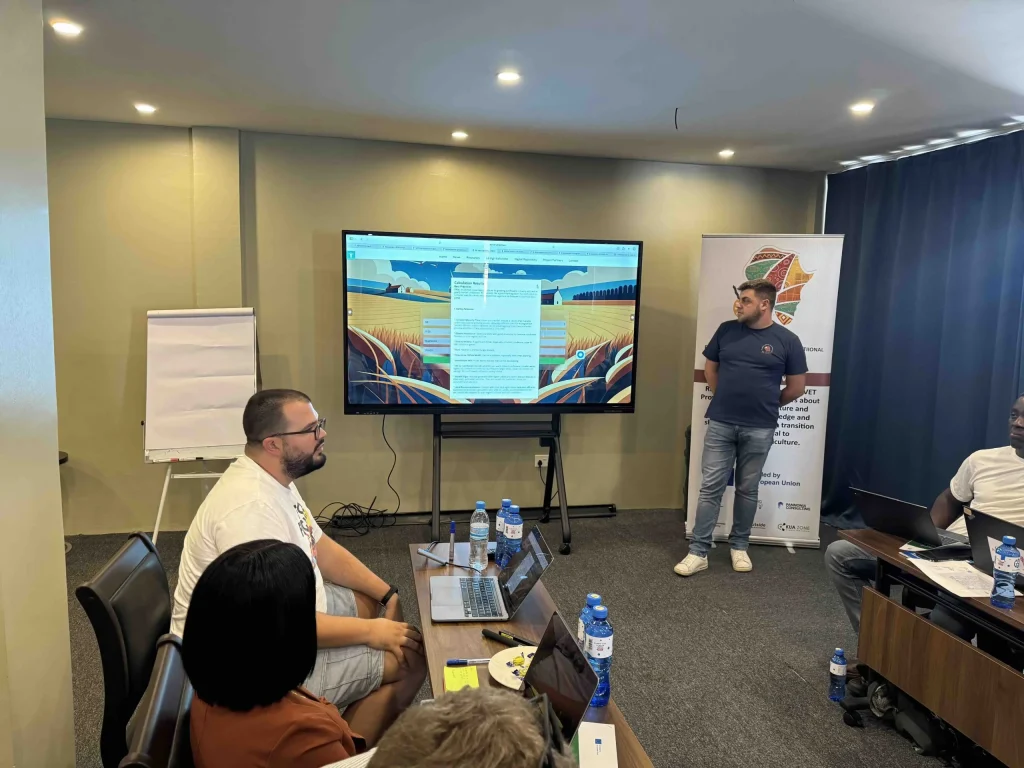
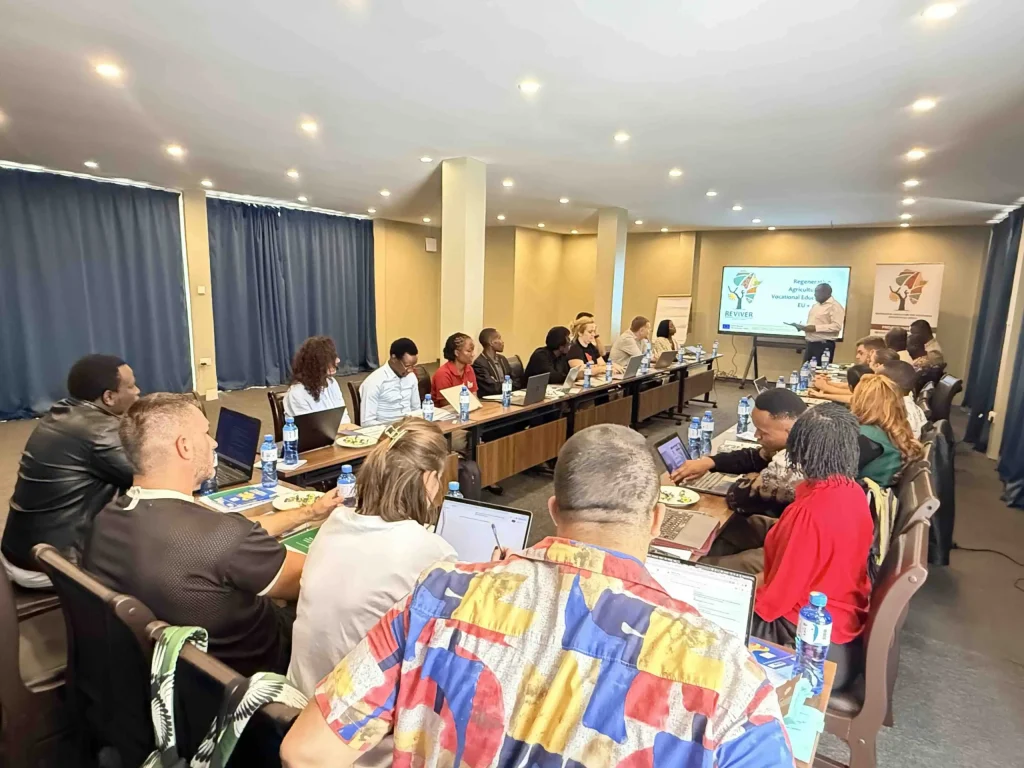
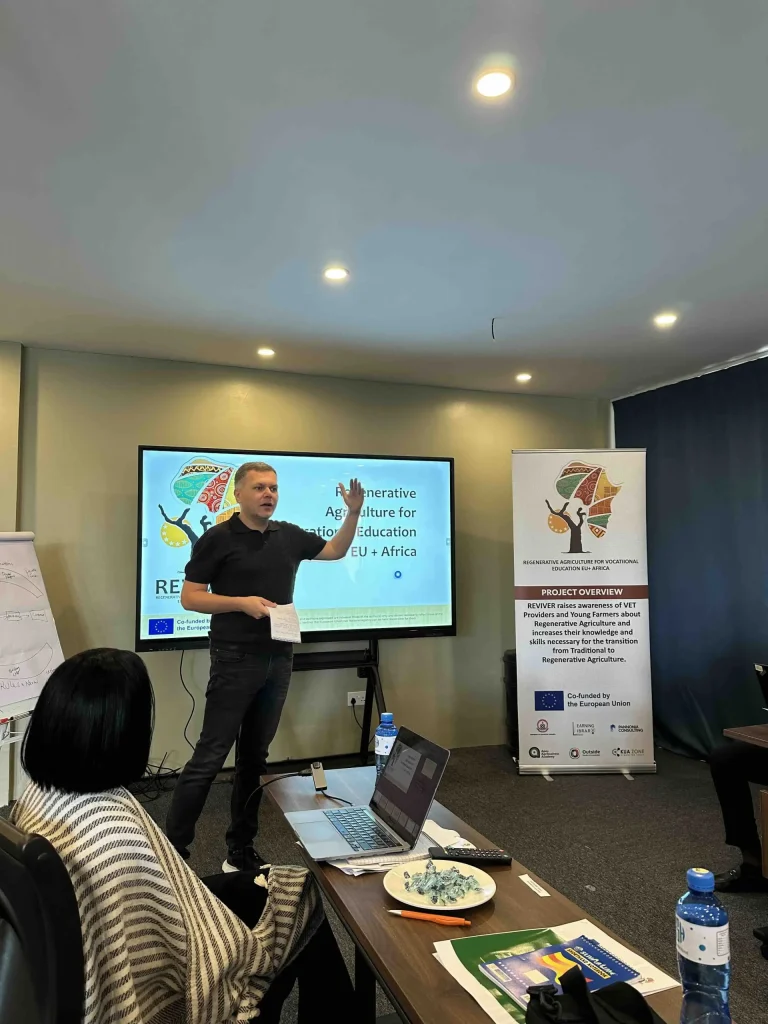
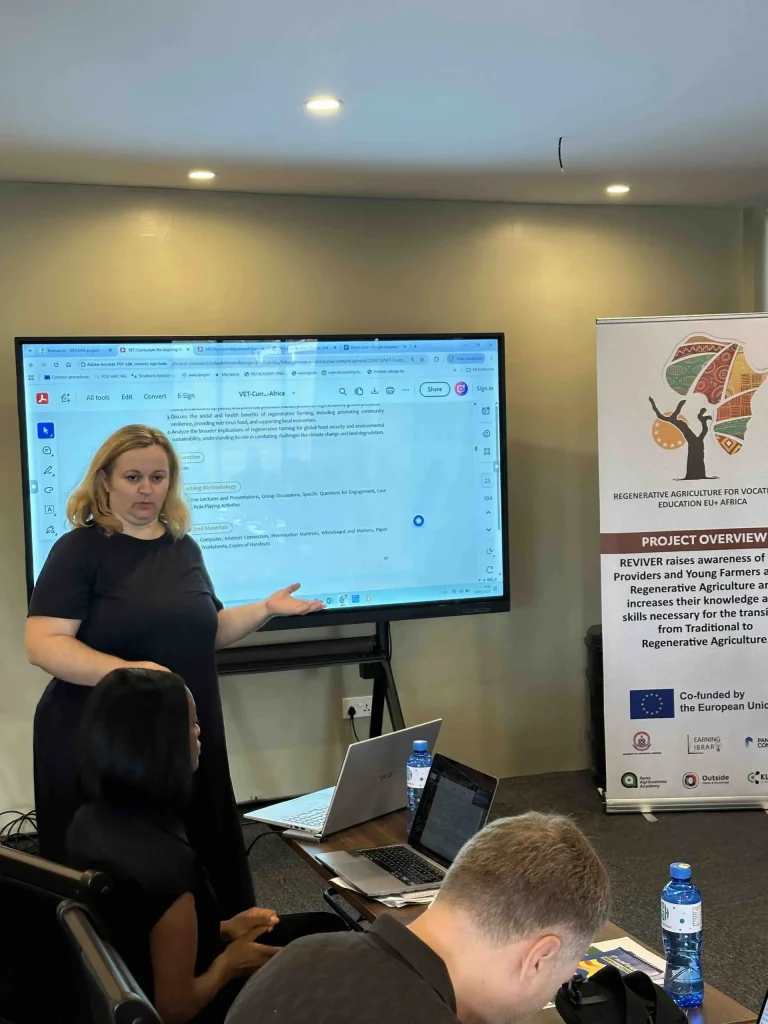
Highlights and key takeaways from Arusha
Participants particularly appreciated the way the conference agenda successfully bridged theory and practice, combining academic insight with real-world relevance. The emphasis on sharing experiences from VET test trainings, curricula, tools, and pilot programs across Europe and Sub-Saharan Africa underscored the importance of translation – turning lessons from research and design into actionable, practice-based training.
Equally important was the diverse stakeholder engagement throughout the event. The inclusion of representatives from government agencies, educational institutions, farming communities, and policymaking bodies ensured that discussions reflected multiple perspectives. This approach aligns with REVIVER’s recognition that systemic change in agriculture requires more than improvements at the farm level – it demands the creation of enabling environments, collaboration, and strong policy uptake.
Scalability and institutional buy-in emerged as recurring themes during the discussions on barriers and enablers to expanding regenerative agriculture practices. Participants highlighted challenges such as limited funding, institutional inertia, lack of awareness, capacity constraints, and policy misalignment. The conference served as a crucial space to strategize how regenerative agriculture modules could be more effectively embedded within existing VET institutions and agricultural extension systems.
Another major insight centered on the importance of policy pathways. The session on “Policy support initiatives for regenerative agriculture” emphasized that sustaining momentum depends on translating the REVIVER project’s outcomes into concrete policy influence, funding mechanisms, and national agricultural strategies.
Finally, the spirit of commitment and collaboration defined the conference’s closing sessions. Through action planning, group commitments, and forward-looking dialogue, participants demonstrated a shared determination to move beyond discussion and toward implementation. The event concluded with a clear call to maintain these alliances across countries, ensuring that the ideas exchanged in Arusha evolve into long-term cooperation and measurable impact.
Challenges and considerations
While the event was ambitious and rich, a few challenges are worth noting (and which were also recognised in REVIVER’s research):
- Contextual diversity: Sub-Saharan Africa’s ecological, climatic, and socio-economic heterogeneity means that regenerative practices must be adaptable. What works in one region (soil type, rainfall, cropping systems) may require modification elsewhere. The curriculum’s regional tailoring is thus essential.
- Resource constraints: Smallholder farmers may lack capital, inputs, or access to markets for regenerative outputs. Without financial support or market incentives, adoption may lag.
- Institutional resistance: Existing VET systems and agricultural extension frameworks may be slow to integrate new curricula. Ensuring institutional buy-in and training the trainers is critical.
- Monitoring and evaluation: Tracking outcomes over time (soil health, yield, biodiversity, socioeconomic impact) is essential. The success of REVIVER will depend on solid MandE systems to validate regenerative practices’ benefits and promote uptake.
- Policy alignment: Without alignment with national agricultural policies, subsidy regimes, and extension support, the uptake of regenerative agriculture may remain marginal. The challenge is translating conference outcomes into government action.
Conclusion
The 2025 Sustainable Regenerative Agriculture Conference in Arusha was more than a meeting – it was a focal point where ideas, evidence, and ambition converged for a shared goal: to transform agriculture in Africa and beyond through regenerative principles. Anchored by the REVIVER project’s vision and resources, the gathering set the stage for deeper cooperation, concrete plans, and the real-world application of curricula, tools, and policy pathways.
